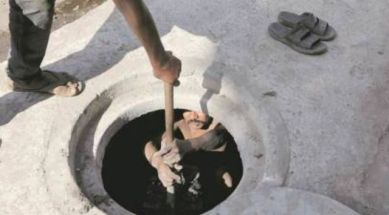Stay updated with the latest - Click here to follow us on Instagram
Maharashtra govt issues guidelines to civic bodies on manual cleaning of septic tanks, sewer lines
The government guidelines also state that a worker must only be allowed to enter the confined spaces for cleaning after safety clearance is issued by the site manager.

In light of the recent incidents where five people died while manually cleaning septic tanks and sewer lines in Mumbai alone, the Maharashtra government rolled out a set of guidelines to civic bodies as well as collectorates across the state, seeking to curb such incidents.
Maintaining that cleaning in confined spaces should only be undertaken through machines, the guidelines say that cleaning by workers must only be carried out in cases of dire necessity.
monthly limit of free stories.
with an Express account.
For these workers, the state has issued an array of guidelines to be followed by various stakeholders. Issued by the Urban Development Department, in its guidelines, the state has instructed that the depth of the confined space requiring cleaning should be measured before the workers enter them.
Before the work on cleaning in such a space commences, the guidelines state that the space must be checked to ensure that it is free from toxic and flammable gases.
For the record, most casualties during cleaning of septic and sewer tanks occur following inhalation of toxic, marsh gases which get generated owing to the reaction of sewage and fecal sludge inside closed chambers, over a long duration.
To prevent direct exposure of oxygen gas which multiplies the risk of fire and explosions, the government has instructed that mechanical ventilation must be provided to ensure air supply. According to the guidelines, the labourers engaged in the works must be trained to carry out such work and must be certified.
“Only certified workers, who have completed training, must be allowed to work in confined spaces like septic tanks and underground sewers, in unavoidable circumstances,” read a part of the government bulletin.
In a bid to maximize the safety of the workers, the state has asked for the provision of all safety equipment including safety glasses, clothes as well as breathing apparatus and a safety belt, through which the labourers can be pulled out, during emergencies.
Furthermore, a labourer, when reporting discomfort, must be withdrawn from the space immediately.
The government guidelines also state that a worker must only be allowed to enter the confined spaces for cleaning after safety clearance is issued by the site manager.
For the private organisations and individuals who also hire the services of labourers to clean the overflowing septic tanks and underground sewers, the guidelines have stated that the hired workers must be trained and registered with the local municipal bodies.
The state’s guidelines come along the heels of the two cases of manual scavenging deaths which were reported in the city in one month.
In the first, three members of a family lost their lives after entering a tank of a public toilet at Ambujwadi on March 21.
In the second incident, on April 24, a worker who was roped in to clean the sewer chamber of an under-construction building in Malad East was killed. One among two brothers who attempted to save the former also died inhaling toxic gases inside the chamber.